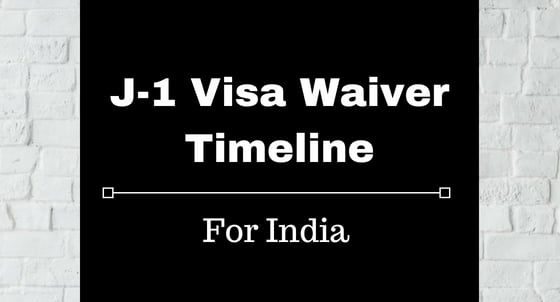Anyone seeking a J-1 visa waiver knows all-too-well how it can be a time-consuming process and often challenging endeavor. While many of the obstacles involve the United State’s immigration timeline, the country of origin also plays a role in how long the entire process takes from beginning to end. In this post, we’ll explore the J-1 waiver timeline for holders from India in addition to the process as a whole.
What is the J-1 Visa?
The J-1 is a work visa that is based on a sponsoring program rather than a sponsoring employer. While technically, most occupations would qualify, here are the most common occupations that J-1 visa holders have:
- Physician
- Professor
- Nanny/Au Pair
- Teacher
- Trainee
- Research or Short-Term Scholar
- Intern
- International Visitor
- Camp Counselor
- Government Visitor
- College or University Student
Your J-1 will be valid for the length of your program and can be altered based on your sponsor. There is a 30-day grace period after the program ends for you to get ready to go back to your home country. Keep in mind that if you leave during this grace period, you will not be admitted back under your J-1 visa.
In fact, you will need to wait two years before returning to the U.S. due to the home residency requirement imposed on each J-1 visa holder. To avoid this requirement, you will need to obtain a J-1 visa waiver. So how can you get the waiver? How long does it take? And what is the J-1 waiver timeline for people from India? Let’s dive into the waiver details to find out.
How to Get a J-1 Visa Waiver
There are several paths that lead to a J-1 visa waiver. Some are relatively simple while others are more complex. Work with your immigration attorney to determine which way is best for your situation. However, it is usually not advised to pursue a waiver through more than one avenue at a time, as that may seem disingenuous to the USCIS and the Waiver Review Division (WRD).
First things first. On paper, the J-1 waiver timeline for India is no different than that for holders from any other country. However, because Indians often make up the majority of work visa applicants, there could be delays associated with your timeline.
No Objection Statement
Individuals who apply for a J-1 visa waiver recommendation from the United States Department of State under the category of a No Objection Statement can expect a decision anywhere from six to eight weeks for favorable decisions. This timeline starts once the department has received all the necessary paperwork including things such as:
- Completed waiver application
- Waiver processing fee
- Copies of DS-2019/IAP-66 forms
- No Objection certificate from your embassy
- Statement of reason
Note that this 6-8-week processing time doesn’t include the length of time it takes to receive the final J-1 waiver certificate from USCIS. Under certain circumstances, it may be necessary to expedite processing if you have not received an answer within that eight-week window.
IGA – Interested Government Agency
If, during your J-1 visa stay, you were working on a project for an agency of the federal U.S. government, that agency can request to have you remain in the U.S. and waive the 2-year home residency requirement. This can also be a solution if you have been working with or for a group that gains the interest of a government agency. If the agency can prove that your return to your home country would damage the projects or work that it is interested in, then the waiver has a high chance of being approved. However, it is still up to the discretion of the USCIS and it’s parent agency, the Department of State.
To file for this, the IGA (interested government agency) must submit a letter that explains the work that you have done and why it is important that you continue that work uninterrupted. It should come accompanied with any documents that may support that claim as well as letters of recommendation from supervisors or distinguished peers. Keep in mind that the IGA must do this, not the J-1 holder.
Persecution
One way to qualify for a J-1 visa waiver is to demonstrate that there is a high probability that you will experience persecution in your home country due to your religion, race, political views, or affiliation with the United States. This persecution cannot be from friends, family members, or other personal relationships. You must be able to show a legitimate cause for fear of persecution from your home country’s government and/or a rebel faction outside of your government’s control.
You will need to submit affidavits that show that you have or will suffer persecution should you be forced to return home as well as written statements detailing the nature of the harm you expect to suffer.
Exceptional Hardship
Under a similar situation as the fear of persecution, you can also have your J-1 home residency requirement waived by demonstrating that having to leave the U.S. for two years would result in exceptional hardship for you or your family. Here are some examples of exceptional hardship that might warrant a J-1 waiver:
- A loss of employment that would result in hardship
- A loss of access to needed healthcare
- Economic hardship
- Psychological hardship
- Hardship involving your spouse such as interruption of education or employment
It is important that these hardships affect not just you, but members of your family as well. It will be easier to have the waiver approved if you are not the sole beneficiary of the waiver. Also, just because there is no single major hardship that would be endured, doesn’t mean that you should avoid filing. Submitting several lighter hardships can be advantageous.
Waiver for Physicians
If you are a physician who wishes to waive the two-year home residency requirement to obtain permanent residence in the U.S., there are four main programs that you can use:
- Conrad-30 – this program is common and allows for 30 J-1 physician waivers each year
- HHS – The U.S. Health and Human Services may express an interest in your work or if you are serving in an area that is medically underserved.
- ARC – the Appalachian Regional Commission spans 13 states including, West Virginia, Virginia, Tennessee, South Carolina, Pennsylvania, Ohio, North Carolina, New York, Mississippi, Maryland, Kentucky, Georgia, and Alabama.
- Delta – the Delta Doctors Program is open for 8 states including Missouri, Illinois, Kentucky, Alabama, Mississippi, Louisiana, Arkansas, and Tennessee.
For all of these programs, you will need to serve in a medically underserved area for a certain amount of time before being able to obtain an unconditional green card through a J-1 visa waiver.
J-1 Waiver Timeline India – No Objection Certificates
When it comes to non-medical J-1 waivers you need to get a No Objection Certificate from a few different offices. First, from the regional passport office here the passport was originally issued. The second is the Home Department of State in India to which you belong to and the last is the Department of Education, Ministry of Human Resource Development in New Delhi.
We can’t pinpoint a definitive amount of time it will take to receive all three certificates since it varies from case to case. However, it has been known to occur as quickly as four to five months.
Processing Estimates Recap
Here are estimates provided by the Department of State for normal processing:
- No Objection– six to eight weeks
- State Dept. of Health– four to six weeks
- Exceptional Hardship– three to four months
- Fear of Persecution– three to four months
- Advisory Opinions- four to six weeks
- Interested Gov. Agency- four to eight weeks
Verifying the Two-Year Home Residency Requirement
One of the major components of the J-1 waiver process is the verification of your two-year home residency requirement. Prior to adjudicating your application, the USCIS officer will not assume that you are exempt from the home residence requirement just because you’ve filed a waiver. If they find that you are indeed subject to this requirement after checking your records, and you have not resided in your country of nationality for at least 2 years after the termination of your program then you may receive a denial. Click here to read 50 frequently asked questions regarding the J-1 waiver.
J-1 Waiver Fee
Based on the DOS regulations, regardless of which type of waiver you request, the cost for processing is the same. Lawyer fees, however, may vary from one law firm to another.
 Shilpa Malik
Shilpa Malik  Sabrina Saada
Sabrina Saada 